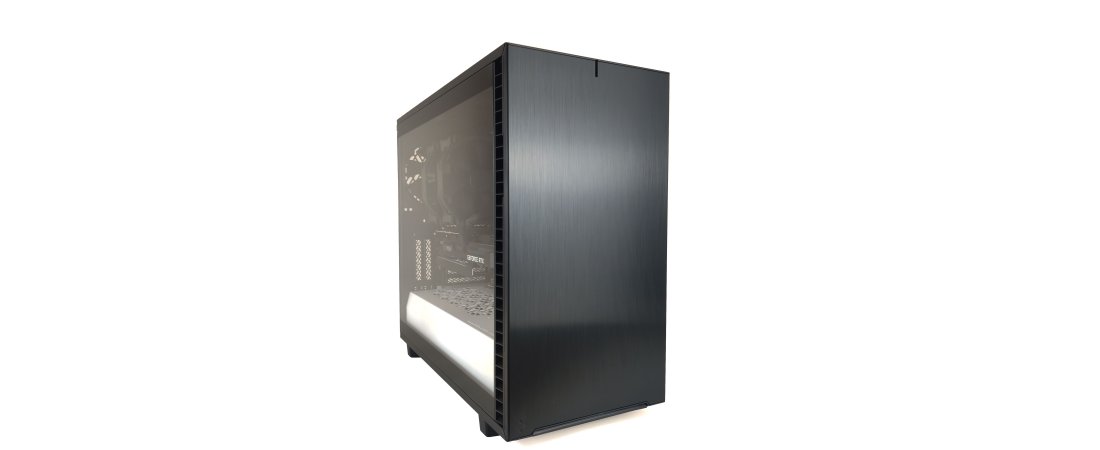TechRadar Verdict
The Wired2Fire Apollo is a fantastic boutique system created for video editors and content creators. The process is transparent and easy to configure, taking the manual work out of building a completely customized system that suits your needs.
Pros
- +
Completely configurable
- +
Well priced for a boutique system
- +
Extremely high performance
Cons
- -
Needs more protective packaging
Why you can trust TechRadar
Two-minute review
The Wired2Fire Apollo is a customizable desktop workstation created for video editing and other demanding creative work. Its design is modern and no-nonsense as Wired2Fire has done a fantastic job of creating a real workhorse without including any unnecessary hardware, which is required on a build like this given how pricey the powerful components required to eat through demanding 3D applications and editing software can be.
This isn't a mainstream offering like the desktop PC systems you'll find churned out by tech brands like HP or Dell, so you won't be able to pop into your local Curry's to grab one, but that comes with its own benefits. As this is a boutique system, you can configure the components in the build to suit your exact needs, rather than buying a preconfigured model that you'll need to expand or upgrade at a later date.
The Apollo is one of several pre-designed models that can be found on the Wired2Fire website, so if you're not keen on the professional look of this system, you can instead select from a list of options that are instead designed with PC gaming or even specifically flight simulation games in mind, both of which offer more RGB lights and general bling.
We're still facing ongoing shortages of hardware like the best graphics cards and best gaming CPUs, so while some folks would have previously considered buying one of these systems somehow inferior to building your own, boutique builders have an easier time getting hold of coveted components that will save you waiting for months to throw your own system together.
Not to mention of course, that not everyone has the patience or technical know-how to assemble a desktop PC themselves. Wired2Fire takes all of the hard work away from having to build your own system, which would be especially useful for creative professionals who just want to get their hands on a powerful workstation with minimal fuss.
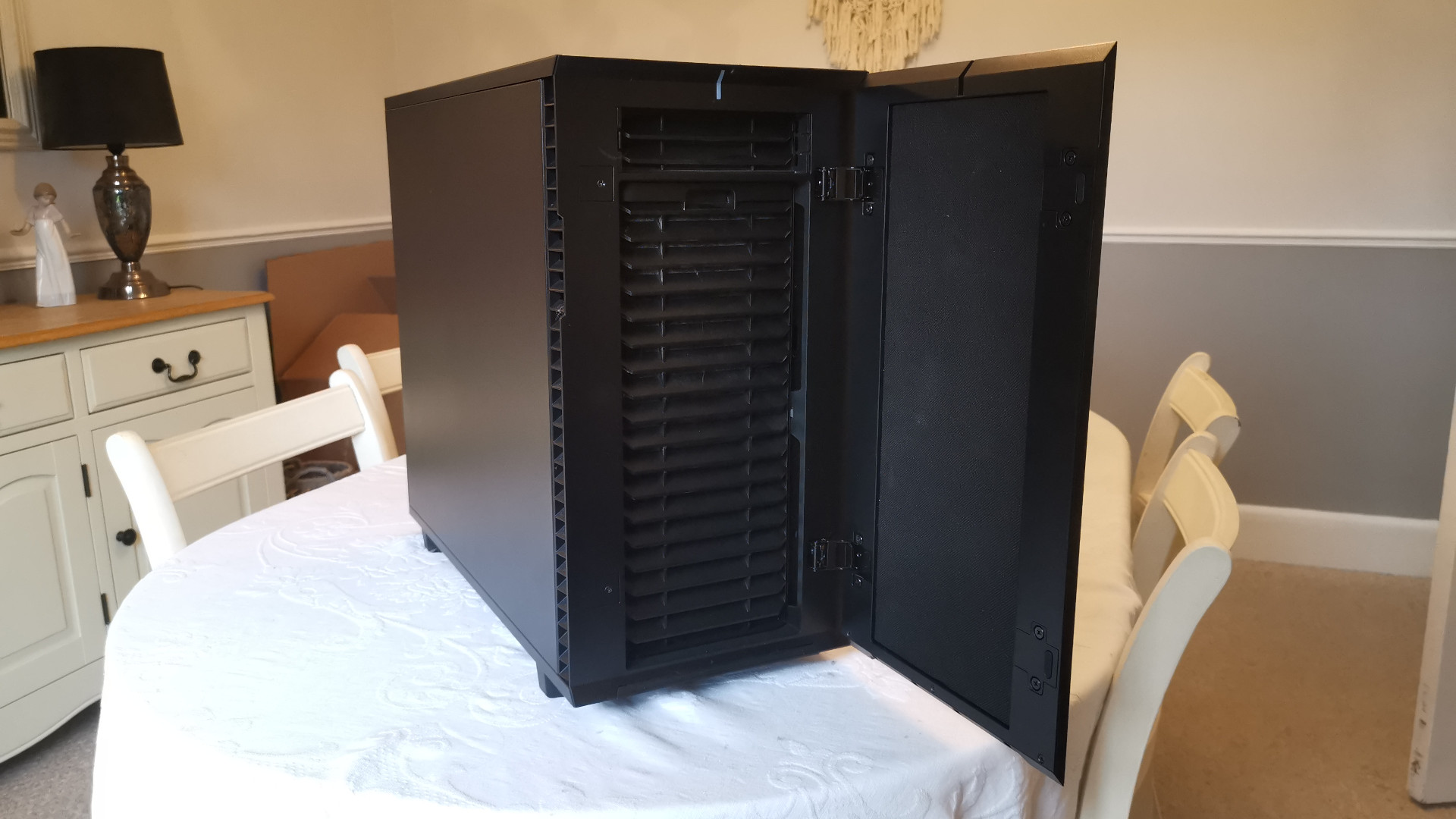
The entire process is actually fantastic for those who don't have any prior experience in building their own computer. Every component can be upgraded or downgraded as required so you can quickly go through the entire build to create a system that hopefully meets both your software and budget requirements.
That isn't to say it's perfect, as some of the options available are intended more for gaming systems than a professional workstation but each component also gets a paragraph of information to help steer people with little technical know-how in the right direction.
PC gaming systems also often experience some crossover with creative workstations as both the latest AAA game titles and 3D game building applications require some powerful hardware, so including components designed for gamers is more of a personal choice than a performance one in some cases.
While Wired2Fire has essentially 'idiot-proofed' the buying process, this is still very much a system that can be enjoyed by experienced professionals. All of the hard work of building and then cable-managing the PC is removed, leaving you to simply unbox, plug in and start working.
Sign up to the TechRadar Pro newsletter to get all the top news, opinion, features and guidance your business needs to succeed!
It was a fantastic system to use, with high performance and very few issues. We enjoyed using it so much during our tests that we were sad to see it go, which is praise in of itself, but just in case it needs to be clearer - the Apollo from Wired2Fire is an ideal choice for anyone who needs some serious power in a PC.
Price and availability
Here is the Wired2Fire Apollo configuration sent to TechRadar for review:
Case: Fractal Define 7
CPU: Intel Core i9-12900K 16-Core (24-Thread) Processor (up to 5.2GHz)
Graphics: MSI NVIDIA Geforce RTX 3070 Ti Ventus 3X 8GB GDDR6X
RAM: 64GB Crucial DDR5 4800MHz Memory (2 x 32GB)
Motherboard: Asus ProArt Z690-Creator Wifi Motherboard
Power Supply: Corsair RMx Series 850W Gold
Storage: Samsung 2TB 980 Pro PCI-E 4.0 (NVMe M.2); Seagate Barracuda 4TB HDD
Ports front: 1 x USB 3.1 Gen 2 Type-C, 2 x USB 3.0, 2 x USB 2.0, 1 x headphone jack, 1 x microphone jack
Ports back: 6 x USB-A 3.2, 2 x Thunderbolt 4 USB-C, 5 x analog audio jacks, 5 x DisplayPort, 2 x HDMI, 2 x Ethernet
Connectivity: Wi-Fi 6E, Wi-Fi, Bluetooth v5.2 hardware ready
Operating system: Windows 11 Home
Size (W x D x H): 547 x 240 x 475 mm
The review unit we tested works out to about £3,499 including VAT (or £2,915.83 excluding), which works out to be around $4,600 / AU$6,250, though this will obviously differ depending on what configuration you go with. Wired2Fire also only ships to the UK and Ireland, so unless you're planning to try another method of getting this system overseas, you'd be better off hunting around for a similar system builder in your country.
The service is certainly very bespoke, and with the current component prices being as high as they are, the same build on PCPartPicker works out at £3,089 (around $4,050 / AU$5,500), and that's with some of the components being listed at a discount rather than MSRP.
The cost certainly isn't cheap, but a powerful workstation rarely is, and despite that being a large sum of money we wouldn't consider it to be especially overpriced for what you're getting. You're also saving a great deal of time and potential frustration from not putting all the parts together yourself, with Wired2Fire having 20 years of PC building experience to offer.
It's also worth bearing in mind that availability for some of the components in our build are especially difficult to get hold of right now, with little availability to find the same MSI Geforce RTX 3070 Ti Ventus GPU on any of the websites that PCPartPicker linked out to, let alone a model at MSRP. If you had your heart set on specific components, going with a boutique building service might be your only chance at getting your hands on them for some time.
Design
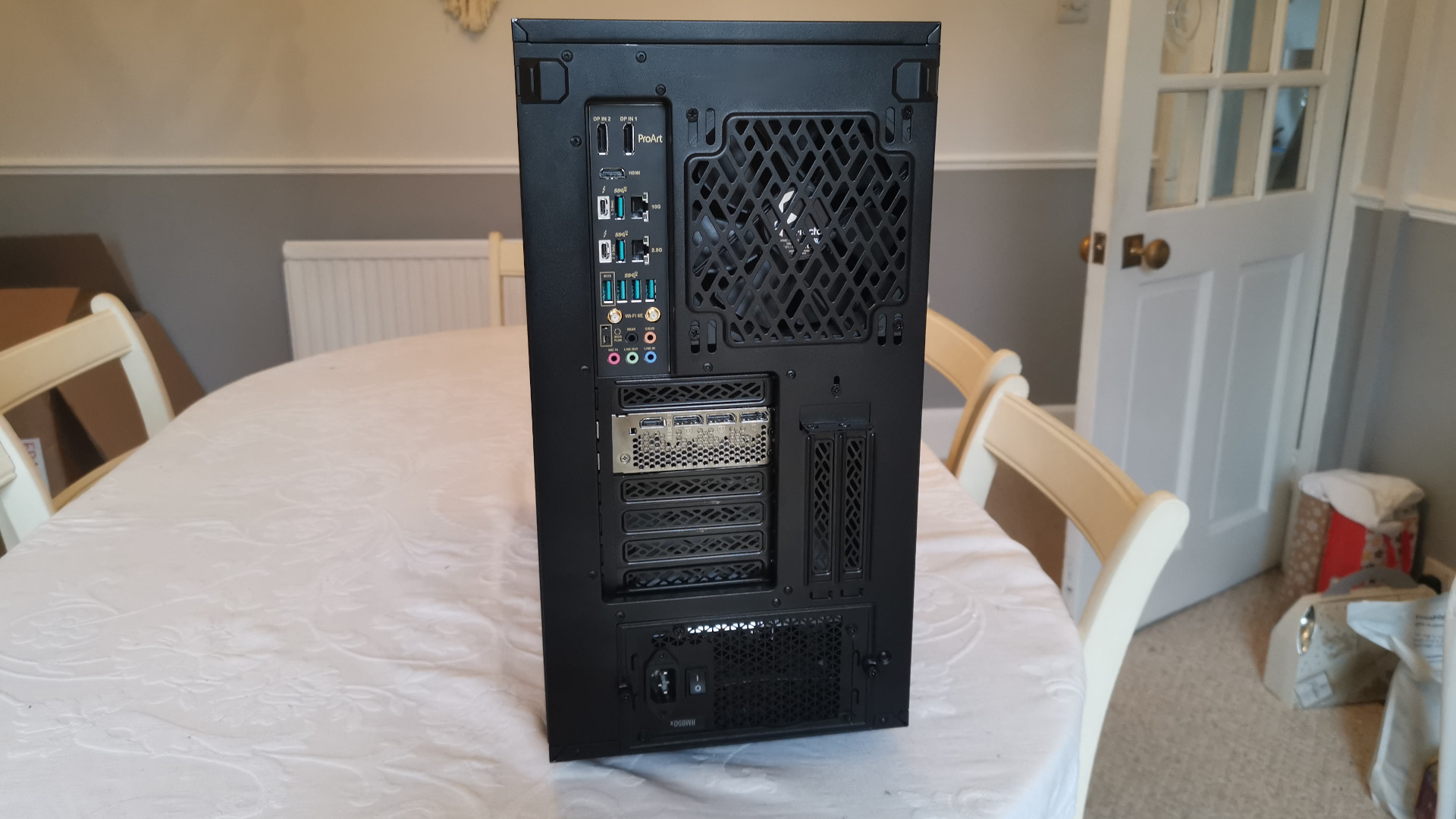
Given you can mix and match everything from the case to its internals, the design of the Wired2Fire Apollo is ...well, whatever you make it to be. That said, the Fractal case and visible components in our review unit are inoffensive if a little bland for those who love to have some funky RGB lighting or a more unique style.
It would look just fine sitting in an office or similar professional setting, and you can include a few options that will jazz it up if you're insistent on adding a more 'gamer' aesthetic to the system, such as a Corsair AIO CPU cooler. We liked the sleeker look as this was less distracting when powering through work, and its worth remembering that this is a system designed for video editors and creatives more than PC gamers.
We did notice that the base configuration offered for the Apollo includes a version of the Fractal Define 7 case that had a tempered glass side panel, however, our own review unit instead came with the windowless version. The hardware list provided to use did state that it should have arrived with the windowed version of this chassis though, so it's worth checking your order to make sure that everything is as it should be.
An additional benefit to this case is that it has a hinged door on the front with a thin brushed aluminum insert and reversible swing that's lined with a thick layer of sound damping material. This helps to reduce the fan noise coming from the system when running heavy workloads, so if you want silence while you're editing, this manages to muffle out most of the volume.
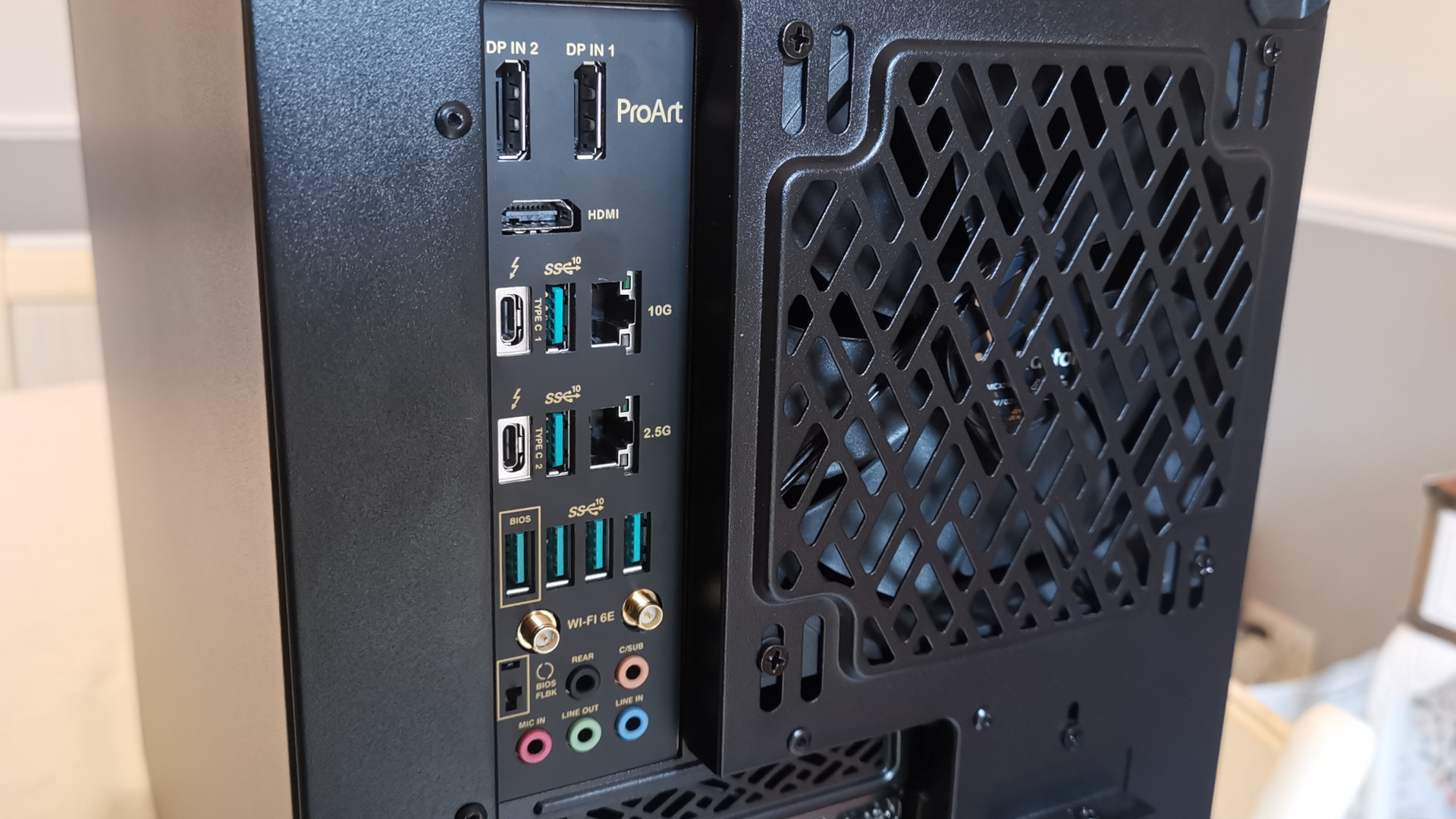
The build quality is very impressive, with the unit coming completely encased in packing foam, with additional protection placed on the inside of the rig. Most of the components are from well-trusted, established brands like Asus and Corsair and you'll get all of the boxes for each component included in your order. This is useful not just for checking authenticity, but also for storing or selling on those parts at a later date if you plan on upgrading the system.
The case itself also has some foam packaging inside to protect the components, but we did notice when unpacking the Apollo from the box it was delivered in that the Noctua CPU cooler was at a slight angle in the case. We haven't seen an air cooler positioned this way before, so we're assuming that it may have become slightly distorted during shipment in some way. That said, it worked just fine and we couldn't find any way to correct its positioning.
Still, it might have been better to include more protective foam as we didn't experience any issues with other ready-made systems from other builders, such as the Opsys Gallantis.
A nice touch is the inclusion of the Asus ProArt Z690-Creator motherboard as it comes with a huge range of different ports for all of your peripherals and additional displays, on top of featuring a 10GbE Marvell LAN as well as 2.5GbE Intel LAN for those on a network connection.
Performance
Here’s how the Wired2Fired Apollo performed in our suite of benchmark tests:
Cinebench R20: 18,307 points
Geekbench 5 Single Core: 1,978; Multi Core: 18,344
PCMark 10 Home: 8,877
3DMark Time Spy: 15,068 | Fire Strike: 32,967 | Night Raid: 76,474
Total War: Three Kingdoms: 407 fps (1080p, low); 120 fps (1080p, ultra)
Metro Exodus: 238 fps (1080p, low) 104.79 fps (1080p, ultra)
Handbrake (1080p, Fast): 80.23fps
Blender: 240 (classroom) | 121 (Fishycat)
Pugetbench Photoshop: 1,304
Pugetbench Premiere: 1,013
Our review model of the Apollo packed an Intel Core i9-12900K, 64GB of DDR5 RAM and an MSI Geforce RTX 3070 Ti Ventus GPU, which makes it ideal for tasks like video editing. This is mostly down to that powerfulful processor as editing video footage is more demanding on your systems CPU than it is graphics, but there's no reason that you couldn't upgrade the GPU to something even beefier if you wanted to turn this into a 3D modelling workstation in preparation of the Metaverse properly taking off.
All that memory also means that the Apollo tears through creative work like butter, completing our Handbrake benchmark in 80.23fps. 64GB of RAM is fairly standard for a workstation like this, but you won't find many options on the market from mainstream manufacturers that can compete given how niche creative desktops are by comparison to gaming systems.
One that comes to mind is the Corsair One i300, which is similarly equipped with a 12th-gen Intel Core i9 processor and 64GB of DDR5, alongside an RTX 3080 Ti graphics card, though this will set you back a whopping £4,399 / $4,999 and doesn't leave much room for upgrades.
If you're solely going for video editing than another alternative could be Apple's recently released Mac Studio, which achieved 54.53fps in the same handrbrake test, though you obviously won't be able to upgrade the Mac system at a later date now that its using its own silicon, the M1 Ultra.
The Apollo isn't a gaming system, but its more than capable of playing pretty much everything you can throw at it, and likely better than most of the desktop gaming PCs you've previously tried. It scored highly on all of our benchmarks, and we managed to run every demanding game we could think of (such as Cyberpunk 2077) with Max settings at 4K.
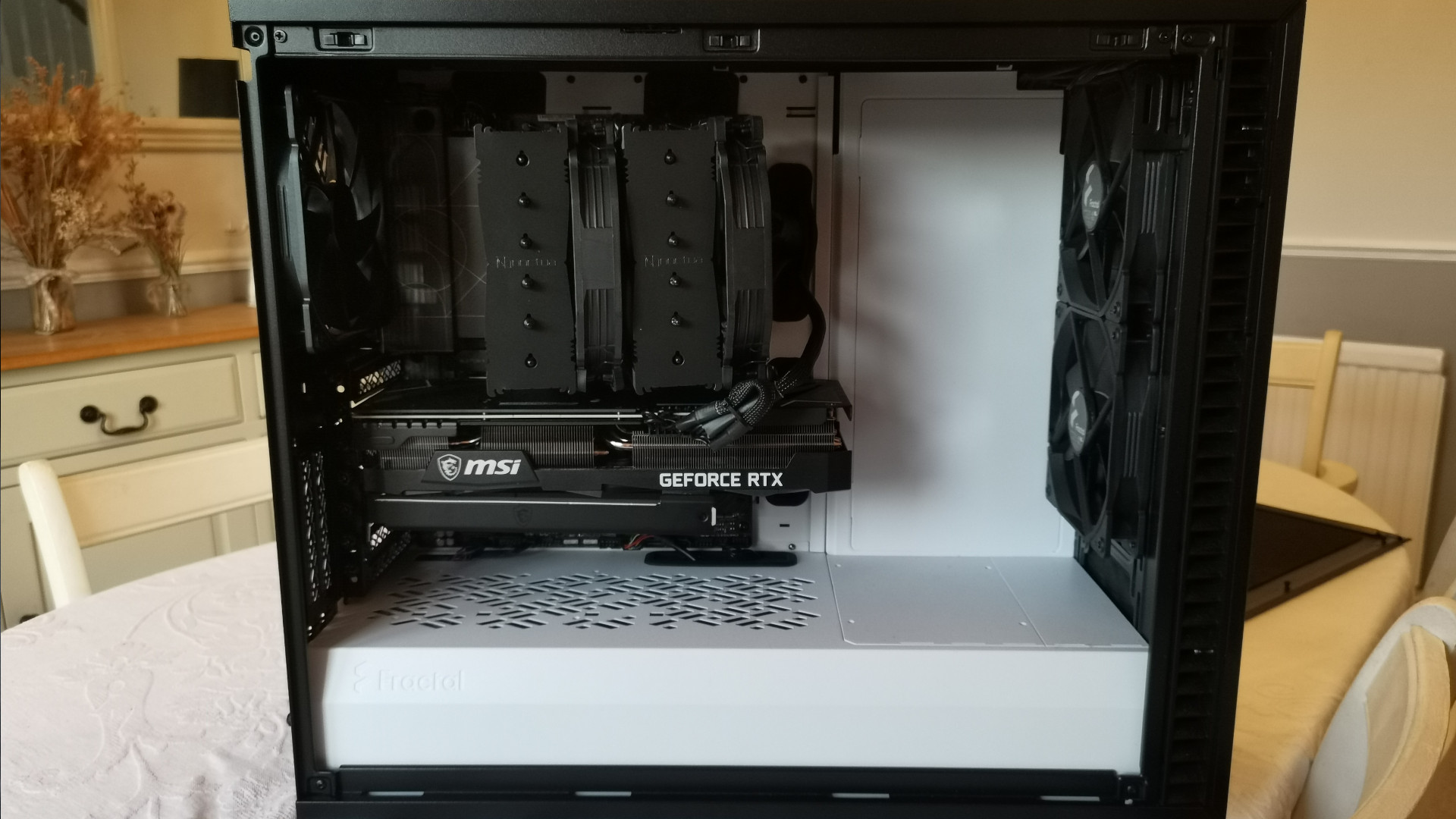
The case fans ran silently and cool even when dealing with large workloads, with temperatures remaining at satisfactory levels after hours of use. We didn't hear much noise even when trying to record video in the same room, so if you like your workstations to not be seen or heard, this is inconspicuous enough to blend into an office environment and not sound like a jet taking off.
The Apollo certainly won't need an upgrade for a while, but there's plenty of room to do so in the coming years (or months if you're waiting for the next generation of AMD and Nvidia graphics cards) as the entire system is fully upgradeable for future-proofing. The PC boots up very quickly from being completely shut down, and given it uses an SSD as a boot-up drive you shouldn't experience any bottlenecks when running overly demanding applications or software.
Given the vast customization and high build quality, we can recommend the Wired2Fire Apollo system for creative professionals and content creators. Sure, its expensive, but all of the components used within the system are on the pricey side, so while the final sum is a hard pill to swallow, it's actually a fair price to pay for a boutique system such as this.
Buy it if...
You want the latest hardware
With DDR5 RAM, a 12th gen intel processor and the current generation of Nvidia graphics, this is packing the very latest hardware on the market, so you won't have to upgrade for some time.
You hate RGB lighting
Many pre-built systems are crammed full of flashy, rainbow lights these days as PC gaming grows in popularity. The Wired2Fire Apollo doesn't need all that though, and instead takes a more conservative approach to its design.
You like full customization
Don't like one of the components in the base model? You can swap out just about anything for another variant of the same components. This means you can fully customize the system to your needs.
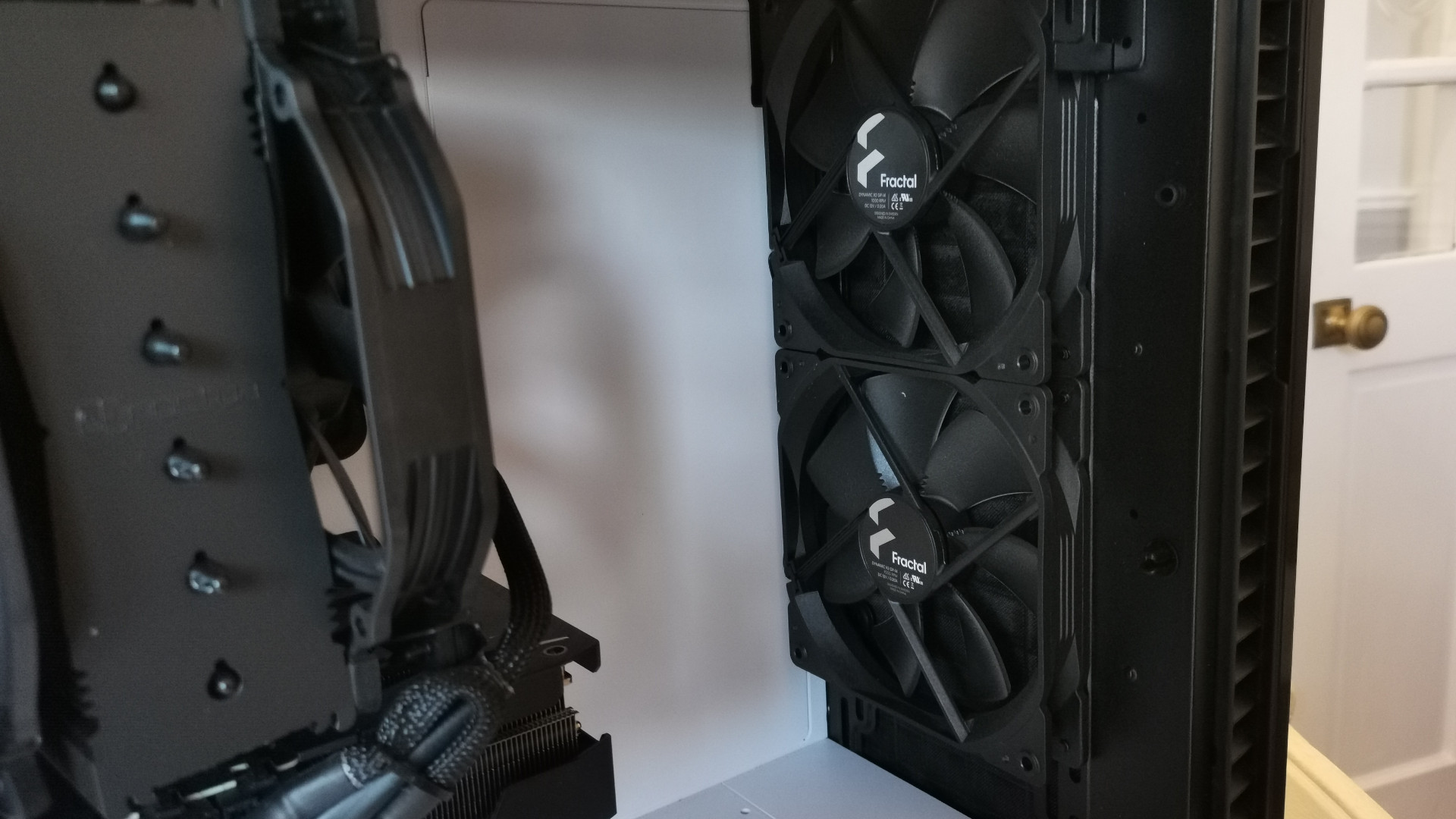
Don't buy it if...
You want something flashy
The design isn't the most inspiring to look at, so if you did want an unusual case or a healthy lashing of RGB lighting effects through the system, there are better options to choose from, even amongst Wired2Fire's other offerings.
You want a custom water loop
Despite being a boutique build, the CPU coolers are limited to products that come off the shelves as is, so there's no option to include anything really custom in this system.
Jess is a former TechRadar Computing writer, where she covered all aspects of Mac and PC hardware, including PC gaming and peripherals. She has been interviewed as an industry expert for the BBC, and while her educational background was in prosthetics and model-making, her true love is in tech and she has built numerous desktop computers over the last 10 years for gaming and content creation. Jess is now a journalist at The Verge.
